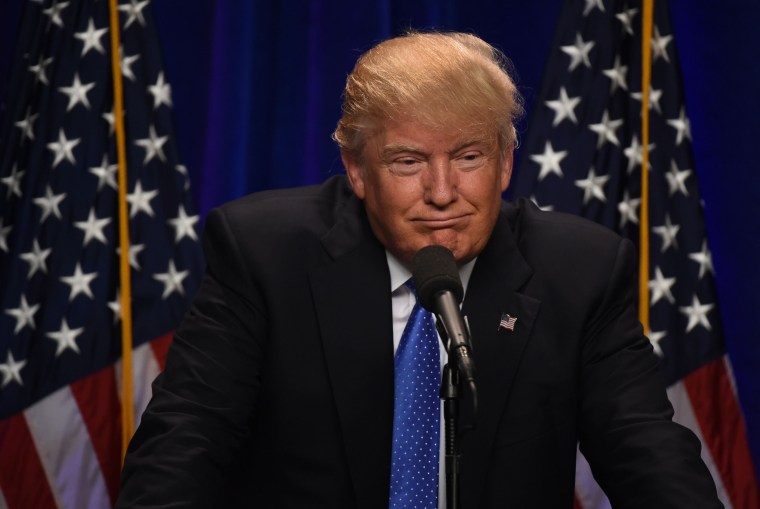Four months after his campaign released a list of advisers that was widely panned by Republican national security experts, the answer remains a bit of a mystery.
“We have received tremendous support from many experts and key advisers,” Trump spokesperson Hope Hicks told NBC News. Asked who specifically those people were, Hicks replied, “None that we are prepared to announce at this time.”
It’s the polar opposite approach to that taken by HIllary Clinton, who has built a staff of hundreds and assembled a baroque network of outside foreign policy advisers. Trump, meanwhile, brags about not needing to rely on establishment experts and is hoping Americans’ disillusionment with the foreign policy status quo will help him carry the day.
The difference has never been clearer than in the wake of the Orlando terror attack.
While Clinton's response was cerebral, Trump was all gut. He smashed the mold of how public figures are supposed to respond crisis — encouraging his supporters while alarming many GOP foreign policy grandees.

“He doesn't appear to want to learn about issues. So, I’m going to vote for Mrs. Clinton,” said former George W. Bush State Department official Richard Armitage, who on Thursday became the latest and highest ranking GOP official to announce he would support Clinton.
There have been some hints of change since Trump’s campaign released its list of foreign policy advisers in March: A meeting with Henry Kissinger, dialog with the chairmen of the Senate and House foreign relation committees, and a meeting with national security experts in Washington.
Several former officials are rumored to have been brought into Trump’s circle, but neither the campaign nor the experts responded to requests for confirmation.
“If you’re parsing his statements like a Talmudic scholar, you can detect differences,” said Peter Feaver, a former National Security Council staffer under George W. Bush and a professor at Duke University. “But overall, it's still a very unconventional campaign.”’
Critics on the right charge that even Trump’s overtures are largely for show.
Related: Why the DNC Won't Call Hillary Clinton the Nominee
“Everybody has told them they need to get more serious. I think there's no interest in that inside the campaign,” said Danielle Pletka, the senior vice president for foreign and defense policy at the conservative American Enterprise Institute. “The campaign has made it clear to absolutely everybody that they'll listen if you really, really want to talk to them, but they don't really give a damn what you people think.
“‘You people’ being experts. People who know where Baghdad is on the map,” added Pletka.
Trump has bragged he doesn’t need outside advisers. “My primary consultant is myself and I have a good instinct for this stuff,” Trump said on MSNBC’s "Morning Joe" in March. “I’m speaking with myself, number one, because I have a very good brain.”
And the feeling appears to be mutual. While many in the GOP political establishment have endorsed the presumptive nominee, there has been no similar mass movement from the Republican national security community to Trump.
“I’ve been to Canberra, Tokyo, Seoul and Beijing in the past months. The allied governments — they’re careful not to say this publicly — but they're deeply alarmed. And the Chinese are intrigued,” said Michael Green, a former Asia policy adviser in George W. Bush’s White House and to Jeb Bush’s presidential campaign.
By this point in the campaign, experts from both sides of the aisle would typically be engaging in policy debates over everything from terrorism policy to Pentagon funding. But Clinton has had the wonk space entirely to herself.
Related: Ryan Instructs Republicans to Follow Their 'Conscience' on Trump
Laura Rosenberger, who served in Clinton’s State Department, now helps oversee a sprawling network of outsider advisers for Clinton’s presidential campaign. It includes experts “for every scenario and every region imaginable,” said Rosenberger.
Everything Clinton says on foreign policy is carefully crafted and vetted, informed by the network of experts and her staff, who also help produce a daily news briefing for the candidate.
Of course, Trump has argued that this kind of Washington group-think is exactly the problem with America’s foreign policy as it exists. He wears his disassociation from the so-called experts as a badge of honor, saying it takes someone from the outside the establishment shake things up and right the ship of state.
“We are in uncharted territory,” said Pletka. “None of the normal rules apply.”
But that’s a feature, not a bug for Trump. Americans are not particularly confident in the current state of affairs, and Trump is hoping they’ll be willing to take a gamble on him.
